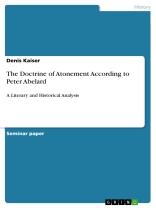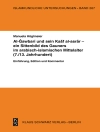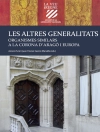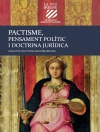Seminar paper from the year 2008 in the subject History of Europe – Middle Ages, Early Modern Age, grade: A, University of St Andrews, course: The Church in the Middle Ages (CHIS 609), language: English, abstract: The twentieth century has witnessed the spread of the so called moral influence theory among Christian believers. Modern promoters of this theory refer to Peter Abelard’s doctrine of the atonement to support their view that Jesus’ incarnation and death played only an exemplary role rather than a substitutionary one. However, several scholars hold the view that this eleventh century philosopher, theologian, and scholar did not deny the substitutionary part of Christ’s death. Yet, other theologians share the view of the modern proponents of the moral influence theory in regard to Abelard’s atonement theology but criticize it as wrong.
Purpose of the Research
This study analyzes the writings of Peter Abelard with a special focus on the Commentaria in Epistolam Pauli ad Romanos in order to give a comprehensive view of his atonement theology and the factors that may have influenced it.
Methodology
First, I want to give a sketch of Abelard’s life and a list of his works in a probable chronological order. Both the biography and bibliography, in drawing a picture of his personality, behavior, actions, writings, and teachings, will help to provide insight into Abelard’s character, and eventually give reasons for the inevitability of misunderstandings.
Second, a survey through the theology of atonement of the preceding centuries, beginning with the Bible and the church fathers, and concluding with Abelard’s contemporary theologians will show similarities and differences between Abelard’s view and the teachings of his predecessors and contemporaries.
Third, Abelard’s writings on atonement are examined with a special attention to his commentary on Romans. Further, I will observe connections to other theological topics, and how they possibly influenced his atonement theology.












